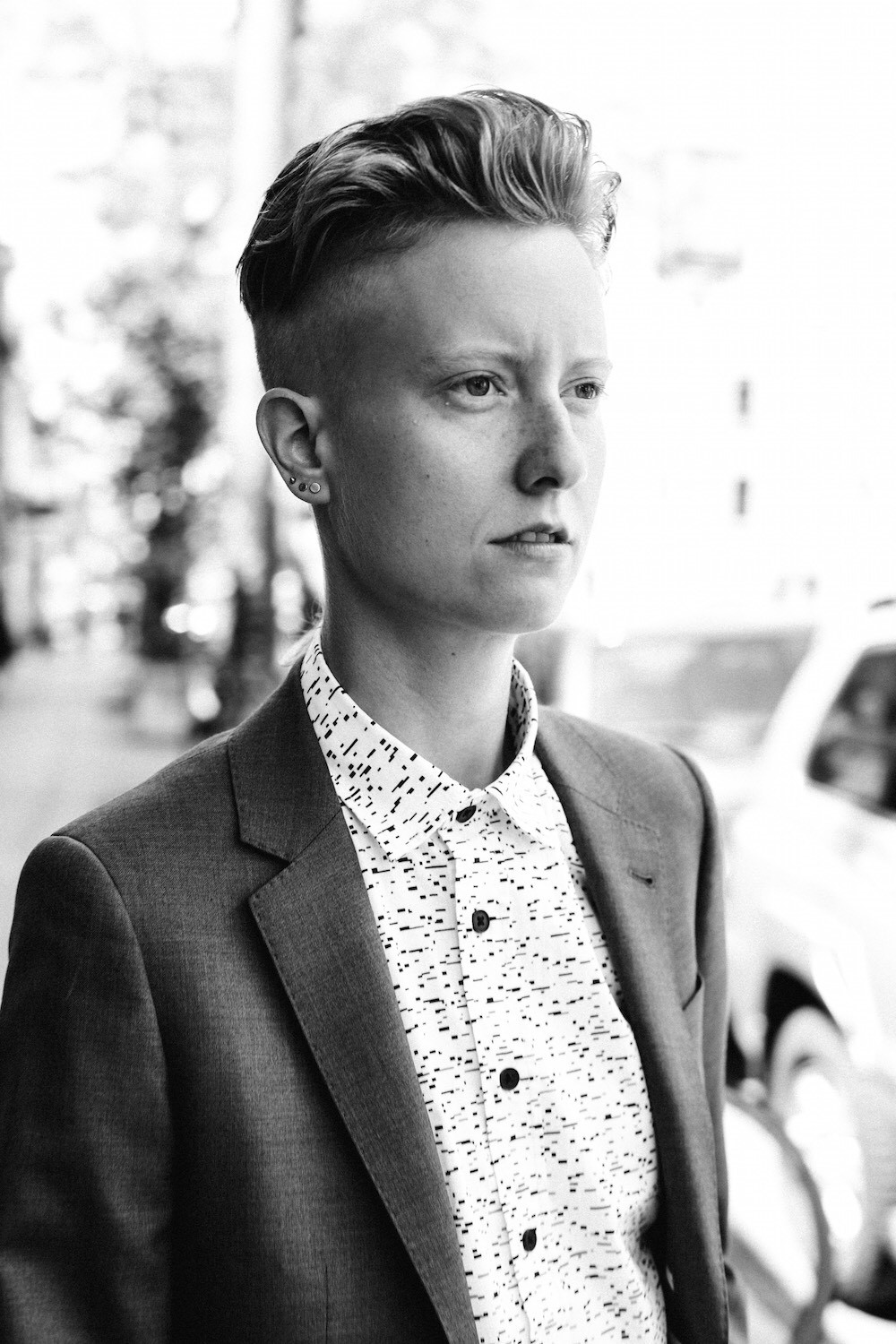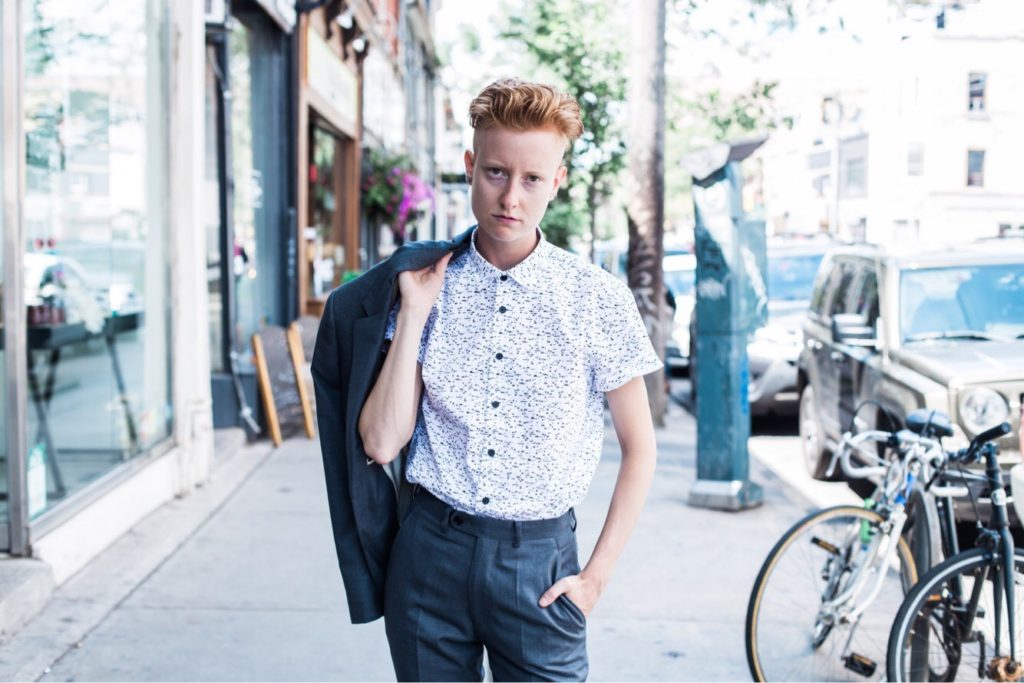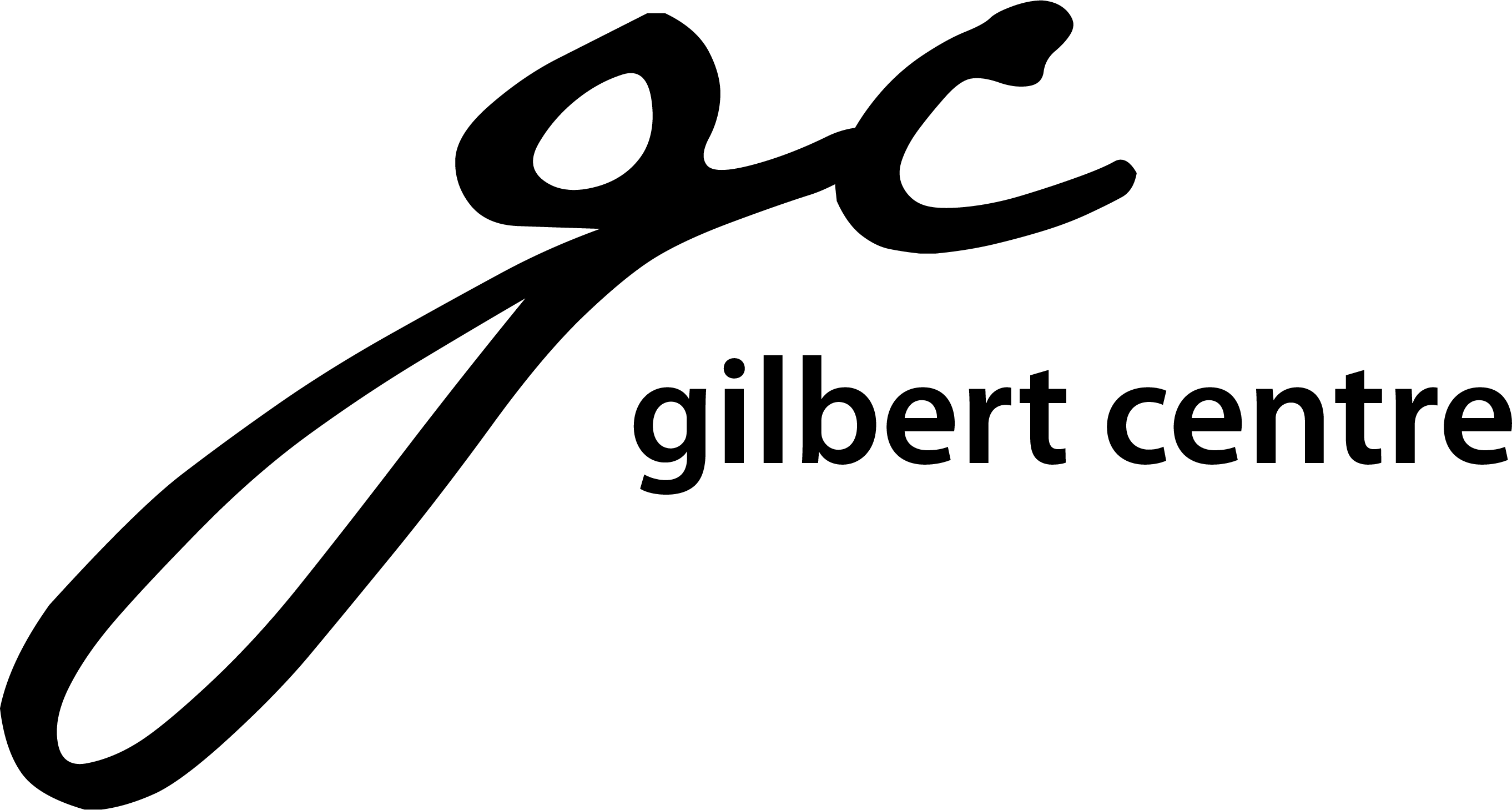
26 Jul My Non-Binary World
A guest post by J Stead, founder NEW FRDM (A Toronto-based non-binary clothing and underwear line) on gender, coming out as genderqueer, and what that means for everyone.
If today, in 2018, an official document insisted I list my gender, the answer would be trans non-binary. Hopefully this hypothetical document leaves a significant amount of blank space for the answer to be written in, because each person could have a very different, very long answer to this once seemingly simple question.
My gender is unique to myself; I am neither male nor female. This existence beyond the gender binary means something different for everyone. To me, it means I can’t be held to any set of gender-based expectations. I choose not to be suppressed by our binary-enforcing society, a society that inadvertently discourages personal exploration while shaming those who veer left of the norm.
The language of gender I am using is not well understood. I know this, because everyday I see gender-normative people struggle to be accepting. Unfortunately, the acceptance they seek isn’t merely a mental thought process, it’s an actual feeling. There’s a great difference between accepting something in your head versus feeling it in your gut, the latter being derived from a sense of understanding and empathy. I believe people are ultimately good. For the most part, people want to accept me and my gender identity – they just don’t know how.
In my life, through my speaking engagements and through my brand NEW FRDM I aim to offer a conceptual understanding of gender that helps the audience relate and empathize with identities that fall outside of societal expectations.
Think of a secret you’ve held. Maybe you were the creative type in an academic family. Maybe you had a forbidden romance. Maybe you scratched your parent’s car and blamed your sibling. Remember how corrosive it felt to hold onto that secret? It ate away at your daily life until it felt like it was all that you were. You thought about it every night; thought about all the ways you could maybe get out of it if you twisted the truth just enough.
As time went on, your ability to resist the truth weakened. Hopefully, you came to find some acceptance within yourself. Maybe your acceptance grew to the point where you were able to let your secret out. And when you finally did, I bet you felt so relieved! You may have even been surprised at how uplifting it was. You knew it was heavy, but you didn’t know what it would feel like once that weight was gone. Suddenly, you’re able to embrace the person you truly are. For a lot of queer people, this is the coming out process.
For many trans people, the secret of their gender lies dormant in them. They’ve been raised to operate within a limited perception of gender, where you’re a man or a woman, depending on what the doctor said when you were born. Our upbringing gave us no concept that our gender may not match our sex-assigned-at-birth, or that there’s an option to live outside the binary all together.
When I was very little, I wanted to be a boy. As a young teen, I came out as a lesbian. In my early twenties, I began to learn about trans people. Now, at 29, it wasn’t until a few years ago, that I was introduced to new gender concepts that made a lot of sense to me.
 Image credit Kristina Ruddick.
Image credit Kristina Ruddick.
Allow me to introduce language that has resonated with me, and helped me find comfort within my own unique gender identity.
There’s so much variance within gender. Gender is not a binary, it’s not even a spectrum. It’s literally unique to every individual; as unique as your fingerprint. No one else has the same gender identity and expression as you.
From the moment we’re born, we are socialized to be a little champion or a little princess. There is not a single moment in our upbringing when we are not encouraged to be one or the other. We’ve been taught to believe that these gender roles are ‘natural,’ when really, they’re deeply culturally ingrained. They have been passed on through generations to the present day.
We’ve constructed a culture that mutes out half of the characteristics of every person. Men are taught not to cry, not to be vulnerable or sensitive. Women are taught to be docile, to submit, to nurture others and ignore their own needs. We’re limiting ourselves by not allowing individuals to embrace their own purpose and potential. This gets amplified to a cultural level, and we are therefore limiting our society’s potential as a whole.
When you see gender this way, do you loosen up? Do you feel more inclined to exist in new parts of yourself, and to let that be okay? As I came to understand this, I was able to begin coming out to myself and to realize the large burden I had been carrying. I realized I was now closer to aligning with who I was born to be!
But when it comes to telling other people, it’s complicated. Coming out as gay in our society is certainly a challenging endeavour, but when you say the words, at least your message is understood. Coming out as genderqueer… How are you supposed to come out when no one understands what you’re coming out as?
Having language for myself now is very important. I know people want to accept me but I also see their discomfort. I live as a NB (non-binary) person everyday and watch people squirm, not knowing how to address me, not wanting to screw up my pronouns, not knowing what to expect of me in a world where gender is so ingrained in everything.
Frequently I’ve heard the argument, “But ‘they’ is a plural, not a singular pronoun!” To that I say, respectfully: I understand it’s hard to relearn using the word ‘they’, but validating people’s identities with this word is significantly more important than your perceptions of grammar! Language is meant to evolve so let’s work together and make it change.
Even those with a cisgendered identity can recognize that none of us fit perfectly into the mainstream culture’s celebrated archetypes of male and female. Gender norms affect and limit us all.
Be yourself. Follow your intuition and tip toe outside rigid gender expectations. By giving yourself that freedom, you are gifting those around you the permission to do the same. Welcome gender variance. Welcome new identities. Understand that NB people’s unique fingerprint of gender identity simply falls moreso outside the expectations of that which was assigned for them at birth. Know that although you may not understand them yet, their bravery to break out of expectations is creating freedom for us all.



Lorna Cunningham-Rushton
Posted at 03:45h, 08 AugustI can’t find a gender comment in my head that you haven’t already presented. As a person in her 70s, and because of the more rigid 2-sex format in which I grew up, it surprises me how easily I fit the description of a woman, yet identify so much more with “person”. Much more thinking to do about this.
Colleen Cooey
Posted at 17:58h, 10 MarchI am grateful for your article and your incredible ability to articulate your thoughts. My youngest identified as non binary at the age of 15 and has been on this journey of self discovery since. At 20 years old my conversations with them reflect your words thoughts and feelings about the society around us. As a parent I held much blame and guilt myself until I understood it was not mine to hold. My now adult child is an incredible support to others and an inspiration to me. I am grateful that I questioned society’s stereo types as a child myself and as a parent, however there is always more to learn. Thank you for sharing the “ you “ of you reading this made me smile on the inside.